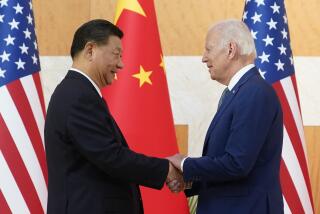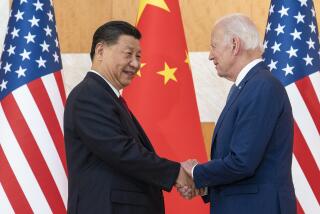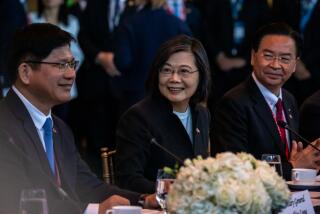China fuming over Bush’s visit with the Dalai Lama
BEIJING — China lashed out Tuesday at President Bush’s White House meeting with the Dalai Lama, arguing that it would seriously damage relations between Washington and Beijing, and called on the U.S. to cancel plans to honor the famous Tibetan figure with a Congressional Gold Medal.
“We solemnly demand that the U.S. cancel the extremely wrong arrangements,” Chinese Foreign Minister Yang Jiechi told reporters hours before the meeting. “It seriously violates the norm of international relations and seriously wounded the feelings of the Chinese people and interfered with China’s internal affairs.”
The Dalai Lama, recipient of the 1989 Nobel Peace Prize, has been based in India since fleeing his homeland during a failed uprising against Chinese rule in 1959. China has condemned him as a “splittist” intent on undermining Chinese sovereignty by working for the independence of Tibet. The Dalai Lama says he is only seeking to expand autonomy, not establish a separate state.
The White House dismissed China’s concerns, saying the president has had private meetings with many religious leaders, including the pope.
“The president believes that people all over the world should be able to express their religion and practice their religion in freedom. And that’s why the president wants to meet with him,” White House Press Secretary Dana Perino said. “He believes he should be honored as a great spiritual leader.”
In recognition of China’s objections, however, the Bush administration did not release photographs of Tuesday’s White House meeting. “We in no way want to stir the pot and make China feel that we are, you know, poking a stick in their eye,” Perino said.
Liu Jianchao, a Foreign Ministry spokesman, said Tuesday that honoring the 72-year-old Dalai Lama would “seriously damage China-U.S. relations,” although he did not specify how. He added that the U.S. should “correct its mistakes and cancel relevant arrangements.”
Liu denied that, in response, China pulled out of a planned international meeting on Iran’s nuclear program, saying that the move was made for “technical reasons.” A State Department official said Monday that Beijing had balked at attending the Berlin meeting, which had been set for today, since it would be on the same day as the congressional award ceremony.
It was not immediately clear whether the meeting, part of a bid to pressure Iran into shutting down its contentious uranium enrichment program, would be rescheduled. Tehran says its program is for only civilian energy purposes, but the U.S. and other countries fear it will be used to build weapons.
China has adopted a middle course. Though opposed to a confrontational approach toward Iran, an ally and energy supplier, it had agreed to meet with the four other permanent members of the U.N. Security Council, plus Germany, to find incentives that Tehran might accept in return for halting the nuclear activities.
China for decades has sought to quash any international recognition of the Dalai Lama, but the spiritual leader remains popular in Tibet despite a long-standing Chinese crackdown.
In August, Chinese authorities arrested a supporter at a festival in Sichuan province, abutting Tibet, after the man called for the exiled spiritual leader’s return, according to the activist group International Campaign for Tibet. Other human rights groups say the man, Runggye Adak, has since been charged with sedition.
Beijing has detained the Panchen Lama, the second-holiest figure in Tibetan Buddhism, since 1995 when he was taken at the age of 6. Apparently not content to tighten its temporal grip, China’s State Administration for Religious Affairs has also sought to impose control over the afterlife with a Sept. 1 order banning living Buddhas from reincarnating without its approval.
Beijing, however, has faced recent setbacks in its bid to subdue the Dalai Lama’s global profile. Last month, German Chancellor Angela Merkel met the Nobel laureate. In June, the Dalai Lama met with Australian Prime Minister John Howard, and last year, Canada granted him honorary citizenship.
Some who favor greater Tibetan autonomy, however, argue that Beijing is ultimately waging a losing battle.
“These sorts of criticisms will not help the image of China internationally,” said Tsering Tashi, the Dalai Lama’s London-based representative at the Office of Tibet, a group that considers itself the government in exile.
Beijing could find itself frustrated by the growing number of Chinese embracing Buddhism and becoming increasingly interested in Tibetan people and culture, he said.
“The Chinese government reacts negatively, whereas many Chinese people are increasingly sympathetic,” Tashi said. “And it’s possible some Chinese officials don’t believe what they say, but they’re forced to do it by their government.”
China’s growing wave of interest in Tibet may be something of a double-edged sword. The opening of a new railroad last year has exposed more Chinese to the region, but some analysts are concerned that their numbers and commercial sensibilities could overwhelm Tibet.
The Dalai Lama’s visit to the White House on Tuesday was his 12th with a sitting or former U.S. president, and his third with Bush. The Congressional Gold Medal, Congress’ highest civilian honor, is being awarded to the Dalai Lama to recognize what Congress called “his many enduring and outstanding contributions to peace, nonviolence, human rights and religious understanding.”
Today’s planned ceremony in Congress for the Dalai Lama comes at a sensitive time for Beijing. This week, China holds its 17th Party Congress, the most important event on the Communist nation’s political calendar, a time when almost any distraction is viewed as an affront.
“We are furious,” said Tibet’s Communist Party boss, Zhang Qingli. “If the Dalai Lama can receive such an award, there can be no justice or good people in this world.”
More to Read
Sign up for Essential California
The most important California stories and recommendations in your inbox every morning.
You may occasionally receive promotional content from the Los Angeles Times.










